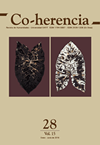People and power the naturalistic approach in the Political Treatise´'s Spinoza
Main Article Content
Keywords
Multitude, power, emotions, commerce, State
Abstract
I. Human beings must be conceived, as any other individual things, within the common order of nature. This naturalism allows to understand that power and right are in perfect agreement. So there´s no neccesity of appealling to any contractual point of view in order to explain the genesis of State. The power of individual things are in agreement with the relations that those ones are capable and, therefore the State is, by definition, the power of people, id est, an individual thing capable of making up and operative unit. III. As soon as any human order is an emotion order, it is understood that rights won´t keep without the common sentiment of human beings. Consequently, any State must always regenerating its stuctures by means of cooperation and mutual assistance between human beings.
Downloads
References
Cristofolini, P. (2007). Popolo e moltitudine nel lessico politico di Spinoza. En R. Caporali, V. Morfino, & S. Vicentin (Eds.). Spinoza: Individuo e moltitudine atti del convegno internazionale di Bologna, 17-19 novembre 2005 (pp. 145-160). Cesena: Il Ponte Vecchio.
Damasio, A. (2010). En busca de Spinoza. Neurobiología de la emoción y los sentimientos. Barcelona: Crítica.
Ezquerra, J. (2014). Un claro laberinto. Lectura de Spinoza. Zaragoza: PUZ.
Hobbes (1993). Leviatán. Madrid: Alianza Editorial.
Macherey, P. (1998). Introduction à l’Éthique de Spinoza. La trosième partie: la vie affective. París: P.U.F.
Matheron, A. (1988). Individu et communauté chez Spinoza. París: Minuit, 1988.
Matheron, A. (2011). Le problème de l’ évolution de Spinoza. Du Traité théologique-politique au Traité politique. En Etudes sur Spinoza et les philosophies de l’âge classique. Lyon: ÉNS éditions.
Montag, W. (2005). Cuerpos, masas, poder. Spinoza y sus contemporáneos. Madrid: Tierradenadie.
Montag, M. (2007). Imitando los afectos de las bestias: interés e inhumanidad en Spinoza. YOUKALI. Revista crítica de las artes y el pensamiento, (4), 54-64. Disponible en http://bit.ly/2BnF00A
Moreau, P-F. (2009). El concepto de ingenium en la obra de Spinoza (I). Ingenium. Revista de historia del pensamiento moderno, (1), 3-12. Disponible en http://bit.ly/2spBTSH
Moreau, P-F. (2010). El concepto de ingenium en la obra de Spinoza (II). El ingenium del pueblo y el alma del Estado. Ingenium. Revista de historia del pensamiento moderno, (3), 80-93. Disponible en http://bit.ly/2EVmrAs
Pizarro, J. P. (2017). El comercio entre las cosas singulares. En Mª L. de la Cámara y J. Carvajal (Eds.), Spinoza y la Antropología en la Modernidad (pp. 203-213). Hildesheim: George Olms Verlag.
Spinoza, B. (1972). Opera, 4 vols. Heidelberg: C. Winters.
Spinoza, B. (1980). Ética demostrada según el orden geométrico (V. Peña, Trad.). Madrid: Orbis.
Spinoza, B. (1988). Correspondencia (A. Domínguez, Trad.). Madrid: Alianza.
Spinoza, B. (2008). Tratado teológico-político (A. Domínguez, Trad.). Madrid: Alianza.
Spinoza, B. (2010). Tratado político (A. Domínguez, Trad.). Madrid: Alianza.
Tatián, D. (2012). Spinoza y la paz. En Spinoza, el don de la filosofía (pp. 77-88). Buenos Aires: Colihue.




